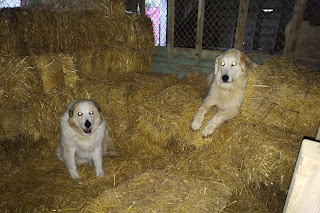August. The bane of many an outdoor worker's existence.
I finally dusted off the window unit and took solace inside during much of the heat of the days the past couple of weeks of triple digit temps.
It was all I could do to make sure I was up and out to keep water buckets full, make sure no one was stuck in fencing, supplement animal feeds, and collect eggs before they started to cook in the shells.
August is a hard month on the farm. For everything. Plants, animals and people.
Most of us have been going pretty much non-stop since January; February at the latest. Planting, weeding, nurturing, harvesting. Harvesting. And more harvesting.
If I don't see another stalk of okra, it'll be OK with me. This year I discovered, after having a full bed of Pick Your Own, that very few enjoy picking themselves, it gives me a severe case of contact dermatitis unless I don long sleeves, gloves and long pants. That's not so fun when it's 80 and 60% humidity.
This was the first year I planted “cow peas” and they just never stop! I picked and picked and then the heat dried so many on the vine..... so now I have a bunch of dried peas to pick and shell..... or turn into the soil as green manure, which is what it's really good for.
So I tend to look forward to a short break in August when I'm just harvesting what I need to eat, any burst of surplus for our local food pantry or an occasional pop up market.
With COVID this year, I pretty much took a hiatus from full-fledged market days. A few people stopped by on the 1st and 3rd Saturdays, and I sold what I had. But I didn't make a big deal out of it this year at all. (We just quietly celebrated our 13th year)
Under normal circumstances I welcome folks to the farm. But, I live here and touch everything all of the time. It's not like I hold market in a sterile parking lot. I didn't want to take the risk for myself or anyone else.
So August was hot, humid and for the most part, quiet and dry. And during that time, even though it's still summer, it's important to begin getting things ready for a fall and winter harvest. We got a few projects knocked out, too. Like this new rainwater collection tank out front for the community gardens.
The ground was dry as a bone, except for very deep where the tomato plant and weed roots are seeking moisture. So it's not good to work soil during that time to preserve the moisture.
But in the little seed greenhouse, the flats are alive! This spring I used a little money
to invest in a misting system for our seed starts. What a big difference it makes! I can sit inside the shade of the house while the timer goes on and off keeping those little seeds just moist enough to germinate for us, even though it's miserably hot outside.
Now, we've had some rain, with more on the way. Making it a tricky timing event to get some beds prepped in between storms, but after the soil has drained enough to keep from destroying the granular structure and the tilth. (Don't ever work clayey soil when it's just rained!)
It sounds like I have today and tomorrow to finish up on the beds I'd started just after the 1/2” and before the big 3” rain came. There was not enough time to drain between that and the 3/4” we got Saturday though, but hopefully because I have a lot of sand, the ground will have drained enough by now to be able to re-disk where the Bermuda has re-awoken, re-harrow the loose vegetation, and lay down a layer of compost.
Then, I'll bed it, cover it with a tarp for a little bit to encourage all of the weed seeds to pop up. I then rake them over, to kill them, re-inoculate the topsoil with some compost tea and plant my seeds. It's important to have a nice, clean bed for seeding.
I use a gifted heavy duty walk-behind seeder that my good friend Farmer Bev gave me. It can smash down some soil clumps; but the bed can't be full of loose vegetation or it'll just drag it and mess up the seed bed and give us poor germination.
Beets, collards, carrots, turnips, cutting lettuces – all of the things that are typically planted close together, are what I generally use a seeder for. This seeder drops seeds nice and evenly, doesn't smash small seed, and covers them up. With any luck, I will have hundreds of feet of beautifully germinated garden in about a week. IF all of the seed doesn't' wash out with this NEXT batch of rain they're calling for.... sigh.
A farmer's work is never done!
Think of a farmer or a rancher as you eat today. Have a great Labor Day everyone! And check out Farmer Bev's new seed and plant start company on Facebook or her Texas Tested Seeds & Plants website.
Marie Eat Your Food - Naturally!










No comments:
Post a Comment
Please feel free to leave a comment.